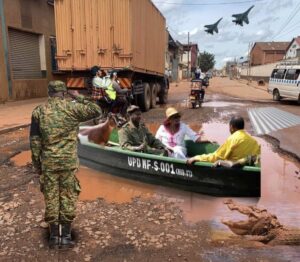by Higerta Gjergji
Dr Jimmy Spire Ssentongo is a Ugandan professor, columnist, portraitist, author and cartoonist. He’s one of the three finalists for the 2024 EU Human Rights Defenders Award. The award is given to a human rights defender who has made an outstanding contribution to the promotion of human rights in his or her community over the past twelve months.

Last April, he sent out a tweet encouraging people to share photos of potholes in the capital, Kampala, Uganda. “A friend of mine is organising a mega Kampala Pothole Photo Exhibition. Share photos of potholes in Kampala city with location, depth, circumference and estimated age of the pothole,” he wrote on the X social network.
In response, Ugandans began posting pictures of the damaged roads. One of the most striking photos showed a hole 30 centimetres across and 3.5 metres in circumference that had been there for two years before the photo was posted. By the end of the day, citizens unhappy with the country’s pothole-ridden roads had tweeted more than 13,000 times using the hashtag #KampalaPotholeExhibition.
Online pressure had a tangible effect. Kampala Capital City Authority (KCCA) executive director Dorothy Kisaka responded publicly to the situation on the roads, acknowledging the limitations caused by inadequate government funding. Parliament has also intervened, with Vice-President Thomas Tabeywa questioning the Minister for Capital and Metropolitan Affairs in Kampala on the pressing issue of road infrastructure. President Yoweri Museveni immediately ordered the Ministry of Finance to allocate six billion shillings (equivalent to $1,538,784) to repair the city’s roads following a growing online outcry.

Nearly a year after the first exhibition, Ssentonga launched six more online campaigns to address issues related to hospital conditions, foreign recruitment scandals, corruption and nepotism within NGOs, human rights abuses and more. Each campaign used a specific hashtag, such as #UgandaHealthExhibition, and encouraged people to share evidence, including photos, videos, audio and documents, of negligence or abuse by the authorities. More than 10 million voices on YouTube, Twitter and Reddit spoke about the #UgandaHealthExhibition campaign, which was launched immediately after the pit protest. Some of the responses, which are still being published, show patients sleeping on hospital floors and report on medical shortages and poor supplies and equipment.
The latest protest, the #UgandaParliamentExhibition, has been going on since the end of February, highlighting issues of government mismanagement. So far, the campaign has prompted the Inspector General of Government (IGG), the government body charged with investigating corruption, to launch a parliamentary investigation into allegations of misappropriation of public funds. Social media is a tricky area in Uganda, where President Yoweri Museveni has been in power since 1986. In 2021, he banned Facebook ahead of elections, prompting many Ugandans to use X.
Ssentongo believes that the digital protests have survived because authorities cannot shut down all channels, and they have learned from the experience of shutting down Facebook that shutting the door only closes it and people use other channels. However, those who use social media to criticise the government face serious consequences. One example is activist Stella Nyanzi, who was convicted in 2017 for making critical comments about President Museveni on Facebook.
The last elections were marked by repression, disruption of internet access, state interference in the work of the media and the closure of any activity to monitor the electoral process. Security forces have repeatedly arrested opposition supporters and killed demonstrators.
The first time Ssentongo realised that his campaigns could endanger his life was last April, after the second protest against the health system. An acquaintance warned him of a possible threat to his life and advised Ssentongo to leave the country soon. He didn’t, and then tweeted, “if they arrest me, go on with the show. They can’t stop the show.”
On the cover photo, night skyline of Kampala City, capital of Uganda ©Arnold Mugasha/Shutterstock.com
























